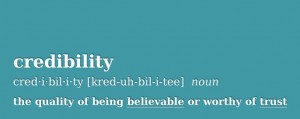 I was conducting a sales strategy workshop yesterday with about a dozen very successful CEO’s and we started talking about credibility and integrity in sales and in relationships, in general. One of the participants commented on the refreshingly authentic and honest outcomes associated with being able to tell someone “they don’t know” when asked a question they could not answer.
I was conducting a sales strategy workshop yesterday with about a dozen very successful CEO’s and we started talking about credibility and integrity in sales and in relationships, in general. One of the participants commented on the refreshingly authentic and honest outcomes associated with being able to tell someone “they don’t know” when asked a question they could not answer.
I have found that there are few people comfortable enough to look a client or prospect in the eye and honestly say “I don’t know.” While we can have the debate about the value, impact or effect of this statement in a subsequent blog, I wanted to use this as an example of having the confidence, the integrity, and the respect of the relationship to be honest.
When its comes to being reliable, trustworthy, or respected there is nothing that destroys a relationship quicker and in a more profound way than someone who has lost their credibility. Far too few people understand the value, importance, and impact of being truthful, direct, honest, forthright in their business relationships.
- Instead of telling someone what they need to know, we try to tell them what we believe they want to hear.
- Instead of saying I really don’t know the answer to that question, they try to find some way to answer it anyway.
- Instead of saying this what I can and cannot do, they try to make a commitment they have no earthly idea how to honor it.
- Instead of respecting the relationship by following through, they disrespect the relationship and fail to deliver.
Here are my five tips for making certain that, if nothing else, you maintain your credibility when it comes to requests, inquiries, and commitments:
- Make the difficult call: We have all had situations where what we thought we could do, we found out later we couldn’t. Before anyone is surprised, disappointed, or frustrated proactively make the call and own up to the error.
- Honor your commitments: If you tell someone you are going to do something, do it. Unless you are dead or in a coma in the hospital you are responsible for fulfillment. If something interrupts your ability to honor that commitment, recruit someone to own the outcome or call the client and tell them the truth about your screw up.
- Don’t ever repeat your mistakes: I learned a long time ago when I was in sales in New York City, my integrity and credibility sometimes bought me one get out of jail card. You will never get a second chance to make a mistake. If you make one and survive it, make certain you do not make that mistake again or make any mistake with that client again.
- Tell the truth: Your customers, friends, and associates do not need you to make them feel good by your telling them what they want to know. They want the truth about a situation. Tell them what they need to know — dont’ sugar coat it, don’t blame someone else, and make certain you follow through on your commitments.
- Be prepared and proactive: Whatever the situation, there will always be the chance that something goes wrong. When it does, own it, fix it, and communicate both the problem and the plan to your client. Most importantly, make sure you share this information with the client before they call you. (remember tip #1). If they have to call you to get the bad news, you have lost all kinds of credibility.
Nothing destroys a great relationship quicker than having a customer or client feel that they can’t trust or count on you. Once you lose credibility with a customer, it is a long, hard, and painful road to getting it back. You are better off making certain you don’t lose it in the first place.
Congratulations
Your first AWS Elastic Beanstalk Node.js application is now running on your own dedicated environment in the AWS Cloud
This environment is launched with Elastic Beanstalk Node.js Platform
What’s Next?
- AWS Elastic Beanstalk overview
- AWS Elastic Beanstalk concepts
- Deploy an Express Application to AWS Elastic Beanstalk
- Deploy an Express Application with Amazon ElastiCache to AWS Elastic Beanstalk
- Deploy a Geddy Application with Amazon ElastiCache to AWS Elastic Beanstalk
- Customizing and Configuring a Node.js Container
- Working with Logs
